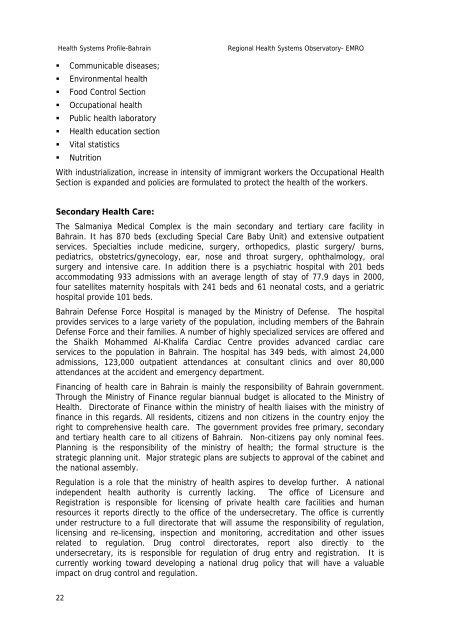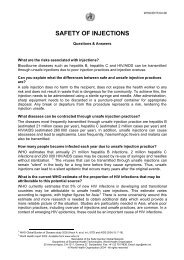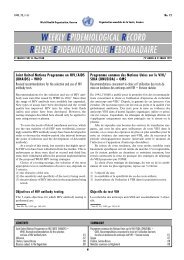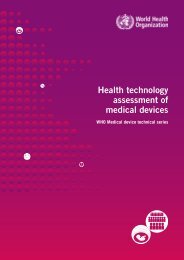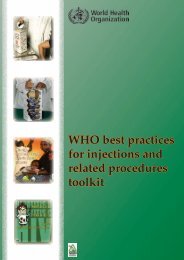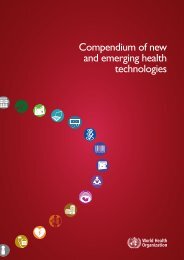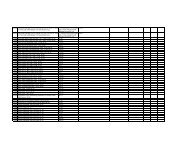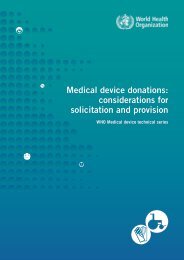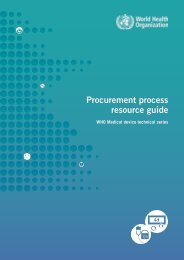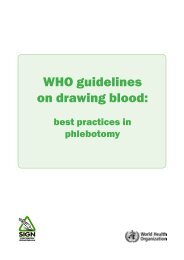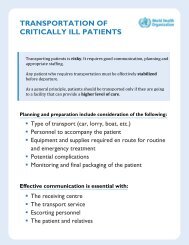Bahrain : Complete Profile - What is GIS - World Health Organization
Bahrain : Complete Profile - What is GIS - World Health Organization
Bahrain : Complete Profile - What is GIS - World Health Organization
Create successful ePaper yourself
Turn your PDF publications into a flip-book with our unique Google optimized e-Paper software.
<strong>Health</strong> Systems <strong>Profile</strong>-<strong>Bahrain</strong><br />
Regional <strong>Health</strong> Systems Observatory- EMRO<br />
• Communicable d<strong>is</strong>eases;<br />
• Environmental health<br />
• Food Control Section<br />
• Occupational health<br />
• Public health laboratory<br />
• <strong>Health</strong> education section<br />
• Vital stat<strong>is</strong>tics<br />
• Nutrition<br />
With industrialization, increase in intensity of immigrant workers the Occupational <strong>Health</strong><br />
Section <strong>is</strong> expanded and policies are formulated to protect the health of the workers.<br />
Secondary <strong>Health</strong> Care:<br />
The Salmaniya Medical Complex <strong>is</strong> the main secondary and tertiary care facility in<br />
<strong>Bahrain</strong>. It has 870 beds (excluding Special Care Baby Unit) and extensive outpatient<br />
services. Specialties include medicine, surgery, orthopedics, plastic surgery/ burns,<br />
pediatrics, obstetrics/gynecology, ear, nose and throat surgery, ophthalmology, oral<br />
surgery and intensive care. In addition there <strong>is</strong> a psychiatric hospital with 201 beds<br />
accommodating 933 adm<strong>is</strong>sions with an average length of stay of 77.9 days in 2000,<br />
four satellites maternity hospitals with 241 beds and 61 neonatal costs, and a geriatric<br />
hospital provide 101 beds.<br />
<strong>Bahrain</strong> Defense Force Hospital <strong>is</strong> managed by the Min<strong>is</strong>try of Defense. The hospital<br />
provides services to a large variety of the population, including members of the <strong>Bahrain</strong><br />
Defense Force and their families. A number of highly specialized services are offered and<br />
the Shaikh Mohammed Al-Khalifa Cardiac Centre provides advanced cardiac care<br />
services to the population in <strong>Bahrain</strong>. The hospital has 349 beds, with almost 24,000<br />
adm<strong>is</strong>sions, 123,000 outpatient attendances at consultant clinics and over 80,000<br />
attendances at the accident and emergency department.<br />
Financing of health care in <strong>Bahrain</strong> <strong>is</strong> mainly the responsibility of <strong>Bahrain</strong> government.<br />
Through the Min<strong>is</strong>try of Finance regular biannual budget <strong>is</strong> allocated to the Min<strong>is</strong>try of<br />
<strong>Health</strong>. Directorate of Finance within the min<strong>is</strong>try of health lia<strong>is</strong>es with the min<strong>is</strong>try of<br />
finance in th<strong>is</strong> regards. All residents, citizens and non citizens in the country enjoy the<br />
right to comprehensive health care. The government provides free primary, secondary<br />
and tertiary health care to all citizens of <strong>Bahrain</strong>. Non-citizens pay only nominal fees.<br />
Planning <strong>is</strong> the responsibility of the min<strong>is</strong>try of health; the formal structure <strong>is</strong> the<br />
strategic planning unit. Major strategic plans are subjects to approval of the cabinet and<br />
the national assembly.<br />
Regulation <strong>is</strong> a role that the min<strong>is</strong>try of health aspires to develop further. A national<br />
independent health authority <strong>is</strong> currently lacking. The office of Licensure and<br />
Reg<strong>is</strong>tration <strong>is</strong> responsible for licensing of private health care facilities and human<br />
resources it reports directly to the office of the undersecretary. The office <strong>is</strong> currently<br />
under restructure to a full directorate that will assume the responsibility of regulation,<br />
licensing and re-licensing, inspection and monitoring, accreditation and other <strong>is</strong>sues<br />
related to regulation. Drug control directorates, report also directly to the<br />
undersecretary, its <strong>is</strong> responsible for regulation of drug entry and reg<strong>is</strong>tration. It <strong>is</strong><br />
currently working toward developing a national drug policy that will have a valuable<br />
impact on drug control and regulation.<br />
22


